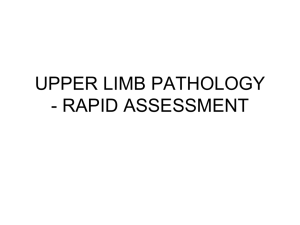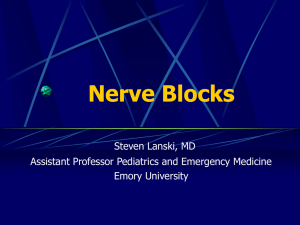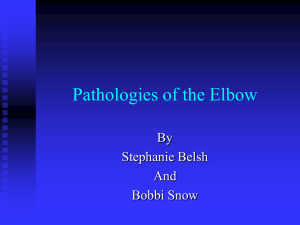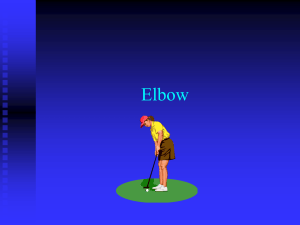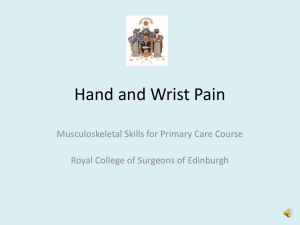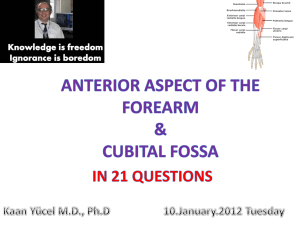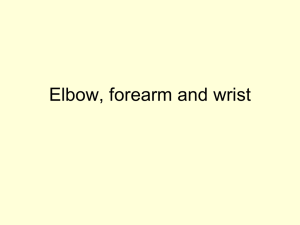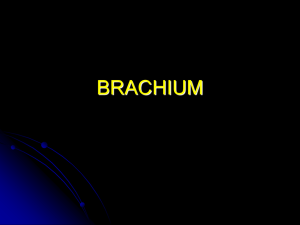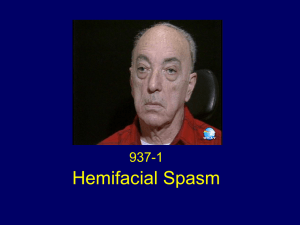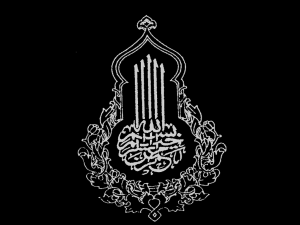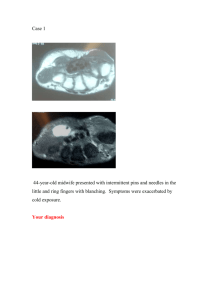Hand Shao-Yin Heart Channel
advertisement
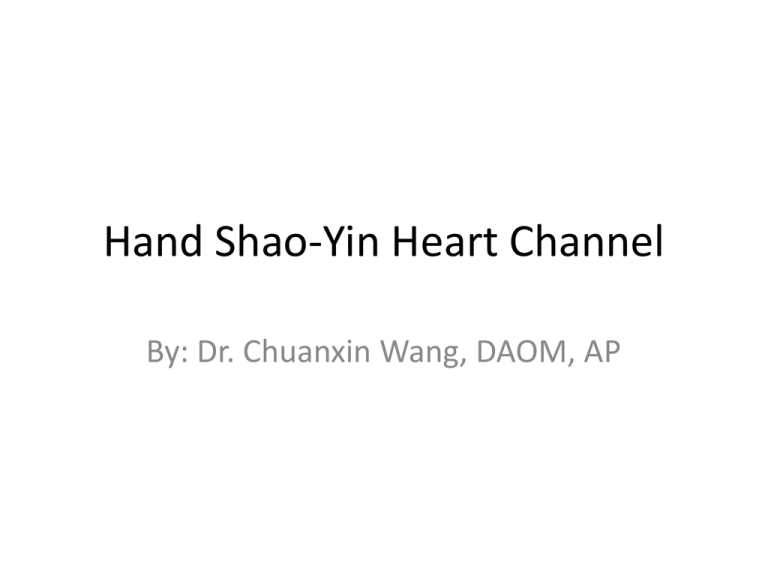
Hand Shao-Yin Heart Channel By: Dr. Chuanxin Wang, DAOM, AP Heart Meridian - Hand Shao Yin General Information Internal/External Pathways Originates at the Heart Spreads over the heart system – Descending branch: Passes through the diaphragm Connects with the small intestine – Ascending branch: Runs alongside esophagus Connects with the eye system – Direct branch: Runs upward to lung Then down and out axilla at HT 1 HT-1, Ji-Quan • Location: At the apex of the axillary fossa, where the pulsation of the axillary artery is palpable. • Indications: Precardial pain, pain in the chest and hypochondriac region, scrofula, cold pain in the elbow and arm, dry throat. Method: Avoid puncturing the axillary artery. Puncture perpendicularly 0.5-1.0 cun, Moxibustionis applicable. Regional anatomy Vasculature: Laterally, the axillary artery. Innervation: The ulnar nerve, median nerve and medial brachial cutaneous nerve. HT-2, Qingling • Location: On the medial side of the arm and on the tree connecting Jiquan(HT1) and Shaohai(HT3) ,3cun above the cubital crease, in the groove medial to the biceps muscle of the arm. • Indications: Precordial pain, pain in the shoulder, arm and hypochondriac region. Method: Puncture perpendicularly 0.3-0.5 cun, Moxibustionis applicable. Regional anatomy Vasculature: The basilica vein ,the superior ulnar collateral artery. Innervation: The medial antebrachial cutaneous nerve, the medial brachial cutaneous nerve and the ulnar nerve. HT-3, Shaohai • Location: With the elbow flexed, at the midpoint of the line connecting the medial end of the cubltal crease and the medial epicondyle of the humerus. • He-sea Point • Water Point • Indications: Precordial pain, contracion and numbness of the upper limb, tremor of the hand, scrofula, pain in the axillary and hypochondriac region. Method: Puncture perpendicularly 0.5-1.0 cun. Moxibustion is applicable. • Regional anatomy Vasculature: The basilic vein, the inferior ulnar collateral artery, the ulnar recurrent artery and vein. Innervation: The medial antebrachial cutaneous nerve. HT-4, Ling dao • Location: On the palmar side of the forearm and on the radial side of the tendon of the ulnar flexor muscle of the wrist, 1. 5 cun proximal to the crease of the wrist. • Jing-river point • Metal Point • Indications: Precordial pain, contraction and pain of upper arm, sudden loss of voice, clonc convulsion. Method: Puncture perpendicularly 0.3-0.5 cun. Moxibustion is applicable. Regional anatomy Vasculature: The ulnar artery. Innervation: The medial antebrachial cutaneous nerve; on the ulnar side, the ulnar nerve. HT-5, Tong-li • Location: On the palmar side of the forearm and on the radial side of the tendon of the ulnar flexor muscle of the wrist, 1 cun proximal to the crease of the wrist. • Luo-connecting point • Indications: Palpitation, dizziness, sore- throat, sudden loss of voice, stiffness of tongue, pain in the elbow and arm. Method: Puncture perpendicularly 0.3-0.5 inch. Moxibustion is applicable. Regional anatomy Vasculature: The ulnar artery. Innervation: The medial antebrachial cutaneous nerve; on the ulnar side, the ulnar nerve. HT-6, Yin-xi • Location: On the palmar side of the forearm and on the radial side of the tendon of the ulnar flexor muscle of the wrist, 0.5 cun proximal to the crease of the wrist. • Xi-cleft Point • Indications: Precordial pain, palpitation, hectic fever with night sweat, hematemesis, epistaxis, sudden loss of voice. Method: Puncture perpendicularly 0.3-0.5 cun, Moxibustion is applicable. Regional anatomy Vasculature: The ulnar artery. Innervation: The medial ante brachial cutaneous nerve; on the ulnar side, the ulnar nerve. HT-7, Shen-Men, Magic Gate Location: On the wrist, at ulnal end of the crease of the wrist ,in the depression of the radial side of the tendon of the ulnal flexor muscle of the wrist . Shu-Stream Point Yuan-Source Point Earth Point • Indications: Precardial pain, irritability, palpitaton, amnesia, insomnia, manic-depressive psychosis, epilepsy, dementia, pain in the hypochondriac region, feverish sensation in palms, jaundice. Method: Puncture perpendicularly 0.3-0.5 cun, Moxibustion is applicable. Regional anatomy Vasculature: The ulnar artery. Innervation: The medial antebrachial cutaneous nerve; on the ulnar side, the ulnar nerve. HT-8, Shao-Fu • Location: In the palm, between the 4th and 5th metacarpal bonse, at the part of the palm touching the tip of the little finger when a fist is made. • Ying-Spring Point • Fire Point • Indicatons: Palpitaton, chest pain, contraction of the little finger, feverish sensation in palms, enuresis, bradyuria, pruritus vulvae. Method: Puncture perpendicularly 0.3-0.5 cun, Moxibustion is applicable. Regional anatomy Vasculature: The common palmar digitalartery and vein. Innervation: The fourth common palmar digital nerve derived from the ulnar nerve. HT-9, Shao-Chong • Location: On the radial side of the distal segment of the little finger,0.1 cun from the corner of the nail. • Jin-Well Point • Wood point • Indications: Palpitation, precardial pain, pain in the chest and hypochondriac region, manic-depressive psychosis, fever, coma. Method: Puncture subcutaneously 0.1 cun, or prick with a three-edged needle to cause bleeding Moxibustion is applicable. Regional anatomy Vasculature: The arterial and venous network formed by the palmar digital proprial artery and vein. Innervation: The palmar digital proprial nerve derived from the ulnar nerve.

